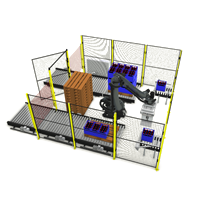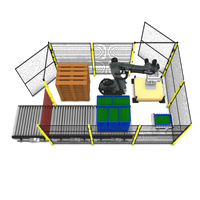With the end of the financial year upon us, we take a look back at 2017 in the manufacturing sector to review how it has impacted companies in the UK. The last 12 months have largely been a success for many in the industry which has led to a number of bullish predictions for 2018 and beyond. Manufacturing accounts for approximately 10% of the British economy and usually provides a strong indication of what the coming months hold in store in financial terms for the country as a whole.
Take a look at the manufacturing industry statistics for 2017 and some of the anticipated statistics for 2018 below.
Statistics for 2017
The strength of the economy came as a surprise to many at the tailed end of 2017, which subsequently led to a more optimistic outlook for 2018.
The National Institute of Economic and Social Research revealed the UK GDP grew by 0.6% in the final three months of last year, up against a predicted forecast of 0.5%. Taking this new estimate into account the UK economy as a whole expanded in 2017 by a total of 1.8%.
The good news is that the manufacturing sector played a significant role in this unexpected rise. In November 2017 alone, the industry grew by 0.4%. More pleasingly, the average between October to December was the highest seen for almost a decade, while also being 3.9% higher than in the same period in 2016. Seven consecutive months of growth marked the first time in 20 years the sector had experienced such a boom.
A growth in exports is the driving factor behind this current surge, assisted by a weaker pound and growing demand from economies in the Eurozone. According to a survey conducted by the Confederation of British Industry (CBI), 42% of those questioned stated output had increased in the final quarter of 2017, with only 11% stating it was down. 28% said their total order books were busier than normal, while 11% revealed orders had slowed in the same period.
What 2018 holds in store
The growth experienced in 2017 has created an optimistic mood for the next 12 months. In particular, manufacturers that have already committed to or are planning to, embrace the advantages that technology can add to their business, look set to benefit the most. This includes tools such robotics, automation, cognitive computing/artificial intelligence (AI), big data and analytics, and internet of things (IoT).
PricewaterhouseCoopers’ (PWC) Annual Manufacturing Report highlighted the important role Industry 4.0 (automation and data exchange) will play in the coming years. 80% of those included in the report believe digital technology has been beneficial to their business, while a further 79% agreed it will allow them to widen their customer base through service-based offering.
A survey of 378 firms in January by manufacturers organisation, EEF, showed that manufacturers are expecting the current cycle of growth to continue. Many are anticipating larger productivity gains for 2018, with 66% of the company’s surveyed anticipating improvements in efficiency.
The EEF also estimate the sector will continue to expand by approximately 2% in 2018, which is faster than the rate at which they expect the UK economy to grow as a whole. This is tempered slightly by output dropping to its lowest level in eight months in February this year, although the demand for new orders indicates this will not be a continuing trend for the next 12 months.
While the uncertainty that continues to linger around Brexit is weakening the strength of the pound, the positive effect it is having on manufacturing looks set to continue in the short to medium term at least. Coupled with the steady improvement of the global economy, this also means demand from overseas should remain stable.
This isn’t to say that Brexit is not a huge concern for industrialists. A lack of a clear national economic purpose from the government means that while many companies are keen to invest in new technology, some remain hesitant in the current climate. With the EU’s Michel Barnier highlighting the need to have the Brexit agreements in place by October of this year, it highlights how important the remainder of this year is to the manufacturing sector.
Conclusion
As we can see, after steady growth across most of 2017, there is currently a lot of optimism in the industry. At the same time, businesses remain cautious as they are aware how quickly the market could change due to the unknown outcome of the Brexit negotiations. With the global economy expanding by 3.3% in 2017, and the World Bank predicting an expansion of 3.1% in 2018, the export market looks set to continue bearing fruit for British manufacturers.
To find out more detail on how we can help your business in 2018, email our helpline helpline@granta-automation.co.uk, or call us on 01223 499488.









Warning: Undefined variable $aria_req in /var/www/granta-automation.co.uk/news/wp-content/themes/twentyten/comments.php on line 81
Warning: Undefined variable $aria_req in /var/www/granta-automation.co.uk/news/wp-content/themes/twentyten/comments.php on line 86